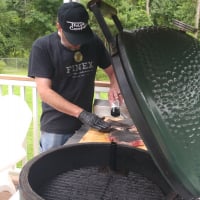Welcome to the EGGhead Forum - a great place to visit and packed with tips and EGGspert advice! You can also join the conversation and get more information and amazing kamado recipes by following Big Green Egg to Experience our World of Flavor™ at:
Want to see how the EGG is made? Click to Watch
Facebook | Twitter | Instagram | Pinterest | Youtube | Vimeo
Share your photos by tagging us and using the hashtag #BigGreenEgg.
Share your photos by tagging us and using the hashtag #BigGreenEgg.
Want to see how the EGG is made? Click to Watch
Tankless Water Heaters "OT"
Comments
-
As part of a bathroom renovation, we recently replaced a 15 year old Rheem tankless with new Rinnai tankless units (propane); stayed with tankless in large part because of very limited space in the utility room.
One thing to consider with tankless is demand - the gallons per minute of hot water needed at a particular time. Our new shower set up included body sprays, and the plumber calculated a single unit could not fully heat the GPM demanded by the sprays. The plumber was right, when switching from regular shower head to body spray (or running both together) the water temp dips for a few seconds until the second heater kicks in. Our units are mounted on and vented directly through an exterior wall.LBGE - St. Louis, MO; MM & LBGE - around 8100' somewhere in the CO Front Range -
In general we like our Rinnai but one problem crept up that the installer never mentioned (and maybe didn't even think about).
Our unit is installed close to the main water lines to prevent too long a run before hot water gets upstairs. The vent for it goes outside and vents directly on our patio where we sit outside to eat/with guests etc.
Whenever someone goes inside to use the hot water the initial few seconds of gas exhaust has a stronger natural gas aroma and everyone on that patio gets a blast of scent. It is only a problem periodically, but it leaves a negative impression that we don't like.
The return on investment by savings was supposed to be 6 or 7 years for us based on our costs and expected water use. I would say we are in that range and now I just hope it remains maintenance free for a long time.
Toronto, Canada
Large BGE, Small BGE
-
Rinnai is what I see at most commercial and industrial sites and they have raved on their performance and longevity. I do not own one myself.LBGE 2013 & MM 2014Die Hard HUSKER & BRONCO FANFlying Low & Slow in "Da Burg" FL
-
@BigWader what you just described is a fairly common gas leak call for my job.
-
I finally decided to replace the tank water heater I have with a tankless one. After some research, I narrowed the choices down to two “finalists”: Takagi and Rinnai tankless water heaters. Rinnai seems to have some advantages, among them higher output (8.3gpm vs. Takagi’s 6.9gmp) and, most important, lower kick-off flow (0.5gpm vs. Takagi’s 0.75gmp). On the other hand Takagi seems more spread than Rinnai and also I could find a lot of information documentation for Takagi and almost none for Rinnai.I found some info on the tankless water heaters at https://ioutdooryou.com/best-tankless-water-heater-for-large-homes/
Need some advice from people who are using these water heaters.
-
I also have a Rinnai. I put it in when I built the house 4 years ago. They were the best at the time, and are still one of the leaders. One thing, get the biggest one. You really don't want to under size. Also, MAKE SURE you have the natural gas pipe size, pressure/cfm needed. These beasts use lots of energy when they fire up. Your old gas line for your tank heater may not be sufficient.
With respect to venting, most of the modern tankless units allow for plain old PVC pipe for the intake and exhaust. Just get a high efficiency condensing unit, the exhaust energy is re-used, so the exhaust is not as hot and you can use PVC. Yes, these high efficiency units cost more.
With respect to saving money. That was not a concern for me. I just want endless hot water, regardless of the cost, and a very small footprint in the mechanical room. The unit I purchased does 9.8 gallons per minute. From what I have learned, do not buy tankless if your sole reason is saving money on fuel. It is too hard to calculate if you will unless you know ALL the variables and it really depends on specific models.
Also, keep in mind that the rating of how many gallons per minute typically assume a 30 degree temperature increase for the water. In my area, my personal well has water always at about 50F. I have my heater set to 135F. I am able to take a shower in a spa type shower that uses 10 gallons per minute with only SOME pressure drop. Not enough pressure drop to really be an issue.
Some models, like my Rinnai, allow you to connect multiple tankless units in series so you can really have endless hot water at any temperature and pressure.XL BGE and Kamado Joe Jr.
Categories
- All Categories
- 184.1K EggHead Forum
- 16.1K Forum List
- 461 EGGtoberfest
- 1.9K Forum Feedback
- 10.5K Off Topic
- 2.4K EGG Table Forum
- 1 Rules & Disclaimer
- 9.2K Cookbook
- 16 Valentines Day
- 118 Holiday Recipes
- 348 Appetizers
- 521 Baking
- 2.5K Beef
- 90 Desserts
- 167 Lamb
- 2.4K Pork
- 1.5K Poultry
- 33 Salads and Dressings
- 322 Sauces, Rubs, Marinades
- 548 Seafood
- 175 Sides
- 122 Soups, Stews, Chilis
- 44 Vegetarian
- 103 Vegetables
- 315 Health
- 293 Weight Loss Forum



